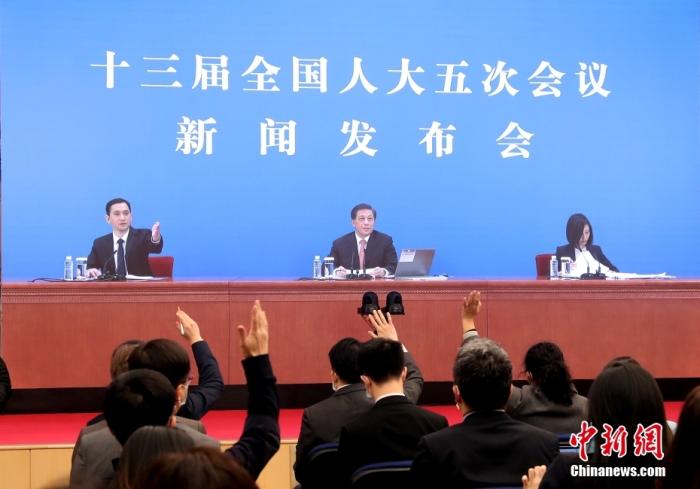(Two Sessions Express) Zhang Yesui talks about neutral relations: China never discriminates against any country or any enterprise, and there is no so-called "economic coercion"
China News Agency, Beijing, March 4 (Reporter Li Jingze) How is the current relationship between China and Lithuania, and whether there is China's "economic coercion" against Lithuania, Zhang Yesui, spokesman for the fifth session of the 13th National People's Congress, responded in Beijing on the 4th.
He clearly pointed out that in international trade, China has always advocated respecting the WTO rules and creating a market environment for fair competition, never discriminating against any country or any enterprise, and there is no so-called "economic coercion" problem.
On the same day, the fifth session of the 13th National People's Congress held a press conference in the press conference hall of the Great Hall of the People. The spokesperson of the conference answered questions from Chinese and foreign reporters on the agenda of the conference and the work of the National People's Congress.
On March 4, the press conference of the fifth session of the 13th National People's Congress was held in the press conference hall of the Great Hall of the People in Beijing. The spokesman of the conference, Zhang Yesui, answered questions from Chinese and foreign reporters on the agenda of the conference and the work of the National People's Congress.
In order to effectively prevent and control the epidemic and jointly maintain public health and health, the press conference was held in the form of online video.
The picture shows reporters raising their hands to ask questions in front of the screen in the sub-venue.
Photo by China News Agency reporter Zhang Yu
Zhang Yesui said that the one-China principle is the universal consensus and recognized norm of international relations in the international community, and it is the political basis for China to develop bilateral relations with all countries.
In 1991, in the communiqué on the establishment of diplomatic relations signed between China and Lithuania, the Lithuanian government recognized that the government of the People's Republic of China is the sole legal government of China and that Taiwan is an inalienable part of China's territory, and made a clear commitment not to establish official relations and conduct official exchanges with Taiwan.
In November last year, the Lithuanian government announced that it would allow the Taiwan authorities to set up a so-called "Taiwan Representative Office in Lithuania", which seriously violated the one-China principle and violated the political commitments Lithuanian made when the two countries established diplomatic relations.
It is completely legitimate and inevitable for the Chinese government to make a firm response to this.
Zhang Yesui pointed out that the responsibility for the problems that have arisen in the relationship between the two countries is entirely on the cube.
In international trade, China has always advocated respecting the rules of the WTO, creating a fair and competitive market environment, never discriminating against any country or any enterprise, and there is no so-called "economic coercion" problem.
Not long ago, the EU appealed to the WTO dispute settlement mechanism about China's economic and trade restrictive measures against Lithuania. Zhang Yesui pointed out that regarding the EU's lawsuit in the WTO, we do not think it is constructive.
It is hoped that the EU will take an objective and fair stance and not expand or elevate the issue of neutrality to the level of China-EU relations.
Last year, the National People's Congress passed the Anti-Foreign Sanctions Law. At the press conference that day, Zhang Yesui emphasized that it is a common practice in many countries to counter foreign sanctions, interference and "long-arm jurisdiction" through legislation.
He said that China's Anti-Foreign Sanctions Law is a highly directional and highly targeted special law, with the word "anti" highlighted.
China does not cause trouble, but it is not afraid of trouble.
With regard to those bullying acts who are wielding sanctions at every turn, China has firmly safeguarded national sovereignty, security, and development interests through legal means such as the Anti-Foreign Sanctions Law, and protected the legitimate rights and interests of Chinese citizens and organizations.
Zhang Yesui pointed out that China has always advocated developing friendly relations with other countries on the basis of adhering to the Five Principles of Peaceful Coexistence, and has always opposed hegemonism and power politics.
China's Anti-Foreign Sanctions Law is a defensive measure in response to containment and suppression, which is fundamentally different from the "unilateral sanctions" of some countries.
(over)

